- Home
- John le Carré
Tinker, Tailor, Soldier, Spy
Tinker, Tailor, Soldier, Spy Read online
Table of Contents
Title Page
Copyright Page
Dedication
Introduction
PART I
Chapter 1
Chapter 2
Chapter 3
Chapter 4
Chapter 5
Chapter 6
Chapter 7
Chapter 8
Chapter 9
Chapter 10
Chapter 11
Chapter 12
Chapter 13
Chapter 14
PART II
Chapter 15
Chapter 16
Chapter 17
Chapter 18
Chapter 19
Chapter 20
Chapter 21
Chapter 22
Chapter 23
Chapter 24
Chapter 25
Chapter 26
Chapter 27
Chapter 28
Chapter 29
PART III
Chapter 30
Chapter 31
Chapter 32
Chapter 33
Chapter 34
Chapter 35
Chapter 36
Chapter 37
Chapter 38
Chapter 39
PENGUIN BOOKS
TINKER, TAILOR, SOLDIER, SPY
JOHN LE CARRÉ, the pseudonym for David Cornwell, was a member of the British Foreign Service from 1959 to 1964. His third novel, The Spy Who Came in from the Cold, became a worldwide bestseller. He has written twenty-one novels, which have been published in thirty-six languages. Many of his books have been made into films, including The Constant Gardener; The Russia House; The Little Drummer Girl; and Tinker, Tailor, Soldier, Spy.
PENGUIN BOOKS
Published by the Penguin Group
Penguin Group (USA) Inc., 375 Hudson Street, New York, New York 10014, U.S.A.
Penguin Group (Canada), 90 Eglinton Avenue East, Suite 700,
Toronto, Ontario, Canada M4P 2Y3 (a division of Pearson Penguin Canada Inc.)
Penguin Books Ltd, 80 Strand, London WC2R 0RL, England
Penguin Ireland, 25 St Stephen’s Green, Dublin 2, Ireland (a division of Penguin Books Ltd)
Penguin Group (Australia), 250 Camberwell Road, Camberwell, Victoria 3124, Australia
(a division of Pearson Australia Group Pty Ltd)
Penguin Books India Pvt Ltd, 11 Community Centre,
Panchsheel Park, New Delhi–110 017, India
Penguin Group (NZ), 67 Apollo Drive, Rosedale, Auckland 0632,
New Zealand (a division of Pearson New Zealand Ltd)
Penguin Books (South Africa) (Pty) Ltd, 24 Sturdee Avenue,
Rosebank, Johannesburg 2196, South Africa
Penguin Books Ltd, Registered Offices:
80 Strand, London WC2 R 0RL, England
First published in the United States of America by Alfred A. Knopf 1974
Published in Penguin Books 2011
Copyright © le Carré Productions, 1974
Introduction copyright © David Cornwell, 1991
All rights reserved
Grateful acknowledgment is made to The Clarendon Press for permission to reprint the
eight-line rhyme and descriptive paragraph from page 404 of the Oxford Dictionary of Nursery
Rhymes, edited by Iona and Peter Opie (1951).
PUBLISHER’S NOTE
This is a work of fiction. Names, characters, places, and incidents are either the product of the
author’s imagination or are used fictitiously, and any resemblance to actual persons, living or
dead, business establishments, events, or locales is entirely coincidental.
eISBN : 978-1-101-52878-5
CIP data available
Set in Janson Text
The scanning, uploading and distribution of this book via the Internet or via any other means
without the permission of the publisher is illegal and punishable by law. Please purchase only
authorized electronic editions, and do not participate in or encourage electronic piracy of copy-
righted materials. Your support of the author’s rights is appreciated.
http://us.penguingroup.com
For James Bennett and Dusty Rhodes, in memory
TINKER,
TAILOR,
SOLDIER,
SAILOR,
RICH MAN,
POOR MAN,
BEGGARMAN,
THIEF.
Small children’s fortune-telling rhyme used when counting cherry stones, waistcoat buttons, daisy petals, or the seeds of the Timothy grass.
—from the Oxford Dictionary of Nursery Rhymes
INTRODUCTION
I have always wanted to set a novel in Cornwall, and to this day Tinker Tailor is as near as I ever came to doing so. The unfinished version that had lain in my desk drawer for years before I started writing the story in earnest did not contain George Smiley at all, but opened instead with a solitary and embittered man living alone on a Cornish cliff, staring up at a single black car as it wove down the hillside towards him. I had chosen in my imagination a spot not unlike the little harbour of Porthgwarra in West Cornwall, where the cottages lie low on the sea’s edge, and the hills behind seem to be pressing them into the sea. My man was holding a bucket in his hand, on his way to feeding his chickens. He had a limp, as Jim Prideaux has a limp in the version you are about to read, and like Jim he was a former British agent who had walked into a trap set for him by a traitor inside his own service, called “The Circus.”
My original plan was for the Circus investigators to put this figure back into harness, in a way that would provoke the unknown traitor to try his hand again, and thus reveal himself. I wanted the entire story to play in contemporary time and not in the flashbacks I later resorted to. But when I got down to writing the book for real, I discovered that I was painting myself into a corner. I could think of no plausible way to pursue a linear path forward while at the same time peering back down the path that had brought my man to the point where the story began. So one day, after months of frustration, I took the whole manuscript into the garden and burned it, and began again.
I had also saddled myself with another headache. I was determined to describe something that in those days was still new to my readers and perhaps, despite all the press revelations about the penetration of our secret services, still is even now: namely, the inside-out logic of a double-agent operation, and the sheer scale of the mayhem that can be visited on an enemy service when its intelligence-gathering efforts fall under the control of its opponent.
Oh, we knew vaguely that Kim Philby had once been head of the counter-intelligence section of the British secret service and privy to American efforts to penetrate the KGB. We knew that at one time he was in line to become chief of the entire British service. Perhaps we even knew that he had personally advised the CIA’s foremost Moscow Centre watcher, James Jesus Angleton, on double-agent cases, in which Philby was held to possess exceptional expertise. We had read perhaps that George Blake, another KGB traitor inside SIS, had betrayed a number of British agents to his Soviet masters—he now claims hundreds, and who is to deny the wretched man his boast? His cause, like his victims, is dead. But what very few people managed to understand was the pushme-pullyou nature of the double-agent’s trade.
For while on one side the secret traitor will be doing his damnedest to frustrate the efforts of his own service, on the other he will be building himself a successful career in it, providing it with the coups and grace-notes that it needs to justify its existence, and generally passing himself off as a capable and trustworthy fellow, a good man on a dark night. The art of the game—best described in J.
C. Masterman’s account of the British double-cross system operated against Germany in wartime—is therefore a balancing act between what is good for the double agent in his role as loyal member of his service, and what is good for your own side in its unrelenting efforts to pervert that service to the point where it is doing more harm to the country that employs it than good; or, as Smiley has it, where it has been pulled inside out.
Such an abject state of affairs was certainly reached by SIS in the high days of Blake and Philby, just as it was self-inflicted on the CIA by the paranoid influence of Angleton himself, who, in the aftermath of discovering that he had been eating out of the hand of the KGB’s most successful double agent, spent the rest of his life trying to prove that the Agency, like SIS, was being controlled by Moscow; and that its occasional successes were consequently no more than sweeteners tossed to it by the fiendish manipulators of the KGB. Angleton was wrong, but his effect on the CIA was as disastrous as if he had been right. Both services would have done much less damage to their countries, moral and financial, if they had simply been disbanded.
I never knew either Blake or Philby, but I always had a quite particular dislike for Philby, and an unnatural sympathy for Blake. The reasons, I fear, have much to do with the inverted snobbery of my class and generation. I disliked Philby because he had so many of my attributes. He was public-school educated, the son of a wayward and dictatorial father—the explorer and adventurer, St. John Philby—he drew people easily to him and he was adept at hiding his feelings, in particular, his seething distaste for the bigotries and prejudices of the English ruling classes. I’m afraid that all of these characteristics have at one time or another been mine. I felt I understood him too well, and in some odd way he seems to have sensed this, for in his last interview before he died he told his interviewer, Phil Knightley, that he had the feeling I knew something discreditable about him. And in a way, he was right: I knew what it was like, as he did, to be brought up by a man so oversized that your only resort as his child was to subterfuge and deceit. And I knew, or thought I knew, how easily the anger and inwardness thus born could turn themselves into a love-hate relationship with the father images of society, and finally with society itself, so that the childish avenger becomes the adult predator, a thing I touched upon in my most autobiographical novel, A Perfect Spy. I knew, if you like, that Philby had taken a road that was dangerously open to myself, though I had resisted it. I knew that he represented one of the—thank God, unrealised—possibilities of my nature.
I warmed to Blake, on the other hand, because he was half a Dutchman and half a Jew, and in both capacities a most unlikely recruit to the secret ranks of the British Establishment. Where Philby had been born inside the fortress and spent his life borrowing beneath its ramparts, Blake had been born in the wastes of foreign and ethnic disadvantage, and had gone to great lengths to gain acceptance by those who secretly despised him: his employers. So that when I started putting together my little bestiary of suspects, I made sure that there were at least two of them—Bland and Esterhase and perhaps Jim Prideaux also—who were alienated by birth from the class structure that they served.
So much for the documentary background. The rest is an informed fantasy. The origin of my use of the word “mole” to describe a long-term penetration agent is a small mystery to me, as it was to the editors of the Oxford English Dictionary, who wrote to me asking whether I had invented it. I could not say for certain. I had a memory that it was current KGB jargon in the days when I was briefly an intelligence officer. I even thought I had seen it written down, in an annexe to the Royal Commission report on the Petrovs, who defected to the Australians in Canberra some time in the Fifties. But the OED couldn’t find the trace and neither could I, so for a long time, I thought perhaps I had. Then one day, I received a letter from a reader, referring me to page 240 of Francis Bacon’s Historie of the Reigne of King Henry the Seventh, published in 1641:As for his secret Spialls, which he did imploy both at home and abroad, by them to discover what Practices and Conspiracies were against him, surely his Case required it: Hee had such Moles perpectually working and casting to undermine him.
Well, I certainly hadn’t read Francis Bacon on moles. Where did he have them from? Or was he just having fun with an apt metaphor?
The other bits of jargon—lamplighter, scalp-hunter, baby-sitter, honey trap and the rest—were all invented, but they too, I am told, have at least in part since been adopted by the professionals. I made no particular cult of them as I wrote: I wished merely to underline the fact that spying for those who do it is a trade like any other, and that, like other trades, it has its little bits of language. The Russians were always more imaginative in this respect, living in daily contact with shoemakers (forgers), neighbours (members of a sister service), pianists (radio operators) and the like. My clandestine vocabulary was therefore a small conceit, but when the BBC’s television version reached the screen, it became for a while a national amusement, for which I was duly grateful.
How do I remember the book now, sixteen years on? Partly, I suppose, for the luck that followed it—the exposure of Blunt, the TV series, Alec Guinness triumphant as George Smiley, not to mention the marvellous direction and casting. And partly, because it restored my spirits after the miserable critical reception given to its predecessor, The Naive and Sentimental Lover. But mostly I remember it for the little boy Bill Roach, who had his counterpart in my own days as a schoolmaster, and later in A Perfect Spy as poor Pym’s son. Roach was not his name, of course, and he did not, so far as I know, spy on members of the staff. But I remember his watchfulness as if it had been my own, and I remember how deeply he got under my skin, perhaps because I could not help thinking of him as myself, when I was fifteen years younger.
And I remember Connie Sachs, too, my Circus researcher, an archetype for the last generation of secret service vestals—clever, unhappy ladies of the English upper classes, who, having joined the service in the war, stayed on to fight the peace, making a kind of granary of their extraordinary memories for us young turks to plunder.
It is odd, in these altered days, to discover that Tinker Tailor is already an historical novel, but I don’t think that makes it irrelevant, and I hope you have as much pleasure with it as I do myself, when I dip into it.
JOHN LE CARRÉ
July 1991
PART I
1
The truth is, if old Major Dover hadn’t dropped dead at Taunton races Jim would never have come to Thursgood’s at all. He came in mid-term without an interview—late May, it was, though no one would have thought it from the weather—employed through one of the shiftier agencies specialising in supply teachers for prep schools, to hold down old Dover’s teaching till someone suitable could be found. “A linguist,” Thursgood told the common-room, “a temporary measure,” and brushed away his forelock in self-defence. “Priddo.” He gave the spelling, “P-r-i-d”—French was not Thursgood’s subject so he consulted the slip of paper—“e-a-u-x, first name James. I think he’ll do us very well till July.” The staff had no difficulty in reading the signals. Jim Prideaux was a poor white of the teaching community. He belonged to the same sad bunch as the late Mrs. Loveday, who had a Persian-lamb coat and stood in for junior divinity until her cheques bounced, or the late Mr. Maltby, the pianist who had been called from choir practice to help the police with their enquiries, and as far as anyone knew was helping them to this day, for Maltby’s trunk still lay in the cellar awaiting instructions. Several of the staff, but chiefly Marjoribanks, were in favour of opening that trunk. They said it contained notorious missing treasures: Aprahamian’s silver-framed picture of his Lebanese mother, for instance; Best-Ingram’s Swiss army penknife and Matron’s watch. But Thursgood set his creaseless face resolutely against their entreaties. Only five years had passed since he had inherited the school from his father, but they had taught him already that some things are best locked away.
Jim Prideaux arrived on a Friday in a rains
torm. The rain rolled like gun-smoke down the brown combes of the Quantocks, then raced across the empty cricket fields into the sandstone of the crumbling façades. He arrived just after lunch, driving an old red Alvis and towing a second-hand trailer that had once been blue. Early afternoons at Thursgood’s are tranquil, a brief truce in the running fight of each school day. The boys are sent to rest in their dormitories, the staff sit in the common-room over coffee reading newspapers or correcting boys’ work. Thursgood reads a novel to his mother. Of the whole school, therefore, only little Bill Roach actually saw Jim arrive, saw the steam belching from the Alvis’s bonnet as it wheezed its way down the pitted drive, windscreen wipers going full pelt and the trailer shuddering through the puddles in pursuit.
Roach was a new boy in those days and graded dull, if not actually deficient. Thursgood’s was his second prep school in two terms. He was a fat round child with asthma, and he spent large parts of his rest kneeling on the end of his bed, gazing through the window. His mother lived grandly in Bath; his father was agreed to be the richest in the school, a distinction which cost the son dear. Coming from a broken home, Roach was also a natural watcher. In Roach’s observation Jim did not stop at the school buildings but continued across the sweep to the stable yard. He knew the layout of the place already. Roach decided later that he must have made a reconnaissance or studied maps. Even when he reached the yard, he didn’t stop but drove straight onto the wet grass, travelling at speed to keep the momentum. Then over the hummock into the Dip, head-first and out of sight. Roach half expected the trailer to jackknife on the brink, Jim took it over so fast, but instead it just lifted its tail and disappeared like a giant rabbit into its hole.

 The Honorable Schoolboy
The Honorable Schoolboy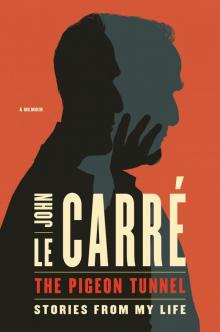 The Pigeon Tunnel: Stories From My Life
The Pigeon Tunnel: Stories From My Life Single & Single
Single & Single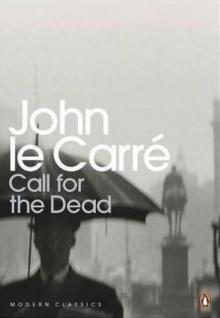 The Spy Who Came in From the Cold
The Spy Who Came in From the Cold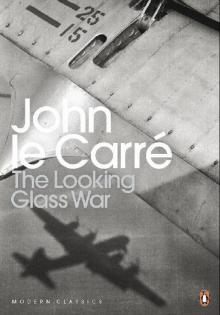 The Looking Glass War
The Looking Glass War The Night Manager
The Night Manager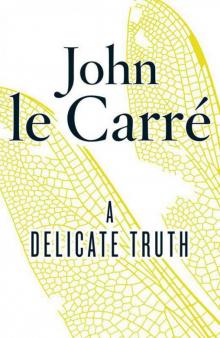 A Delicate Truth
A Delicate Truth A Perfect Spy
A Perfect Spy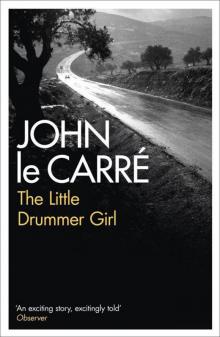 The Little Drummer Girl
The Little Drummer Girl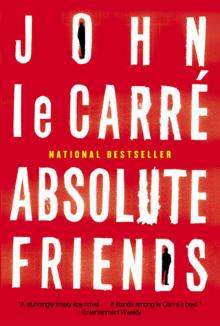 Absolute Friends
Absolute Friends A Murder of Quality AND Call for the Dead
A Murder of Quality AND Call for the Dead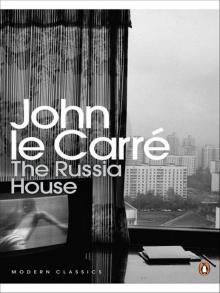 The Russia House
The Russia House The Tailor of Panama
The Tailor of Panama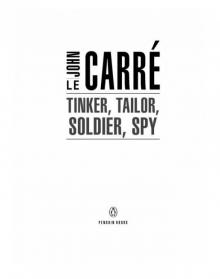 Tinker, Tailor, Soldier, Spy
Tinker, Tailor, Soldier, Spy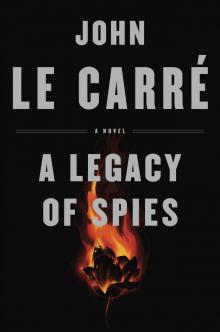 A Legacy of Spies
A Legacy of Spies The Mission Song
The Mission Song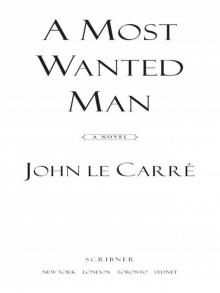 A Most Wanted Man
A Most Wanted Man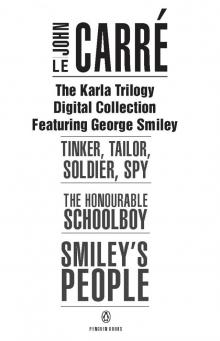 John Le Carré: Three Complete Novels
John Le Carré: Three Complete Novels The Secret Pilgrim
The Secret Pilgrim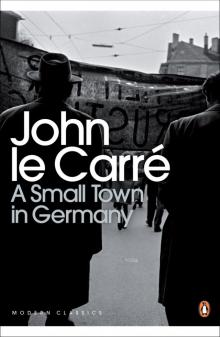 A Small Town in Germany
A Small Town in Germany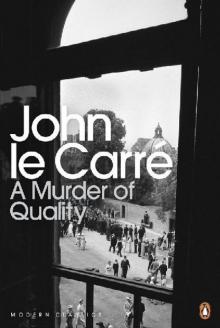 A Murder of Quality
A Murder of Quality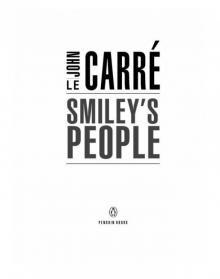 Smiley's People
Smiley's People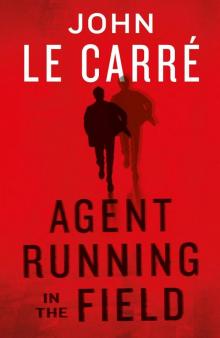 Agent Running in the Field
Agent Running in the Field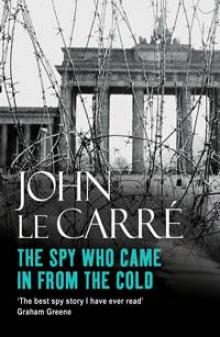 The Spy Who Came in from the Cold s-3
The Spy Who Came in from the Cold s-3 The Pigeon Tunnel
The Pigeon Tunnel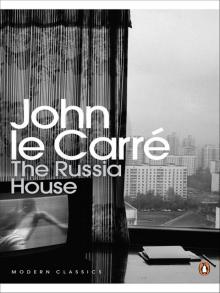 The Russia House - 13
The Russia House - 13 The Honourable Schoolboy
The Honourable Schoolboy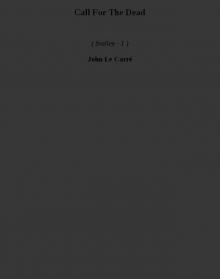 Call For The Dead s-1
Call For The Dead s-1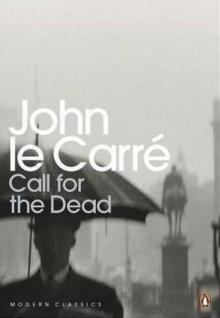 Call for the Dead
Call for the Dead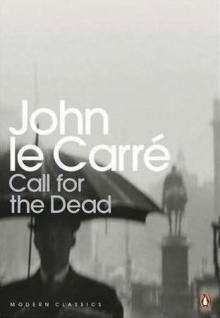 Call for the Dead - 1
Call for the Dead - 1